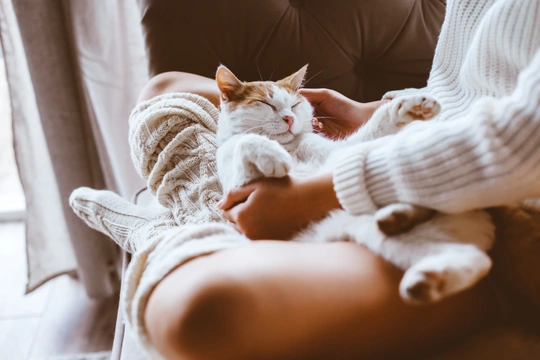
Having a cat allergy doesn't have to stop you from being a cat parent. What are the low allergy cat breeds?
Having a cat allergy is common, but it’s so limiting when it comes to interacting with animals or choosing a pet. Domestic pets can be such fantastic companions and teach us a lot about life and caring for other beings. So why miss out? You’ll be happy to learn there is a way to find a cat for allergic humans.
Before diving in, a little-known fact is that many people don’t actually have a cat hair allergy. Rather, they’re triggered by proteins in their bodily fluids. Others have a cat dander allergy, which simply means they react to the cat’s skin flakes. So, as well as selecting the right breed that’s compatible with your allergy, simply being vigilant about cleaning up your cat’s favourite spots in the house, bathing, brushing, and washing hands can already go some way towards reducing symptoms.
The best breeds for cat allergy sufferers
Balinese
A relative of the Siamese cat, this fluffier feline is a low shedder with minimal brushing requirements, which makes it an excellent choice of cat for allergic humans. The protein that causes some allergies, Fel D 1, is less abundant in Balinese cats - another reason to consider this beautiful, affectionate puss.
This sleek beauty, like the Balinese, has less of the Fel-D1 protein and is a low shedder, so it ticks some of the boxes for those seeking a low allergy cat. The Russian blue is sleek and gorgeous and will happily adapt to family activities and the giving and receiving of affection.
Despite their long hair, the Siberian is a firm favourite, especially for families, as they get along well with kids and other pets. They’re curious and intelligent; watch them figure out puzzles and, annoyingly, get to wherever they want to be! They do require brushing, but usually only once a week, and they shed seasonally. This cute, cuddly kitty is recommended to allergy sufferers for its low Fel D-1 and Fel D-4 production and could be the family pet of your dreams.
Sleek coated and super fun to be around, the cornish rex is a low shedder and requires no brushing. Occasional baths will ensure low allergen shedding - if you’re looking for a low maintenance, low allergy cat, you might have found it. An added bonus is that they’re very playful and active, providing much entertainment for people looking for an interactive pet!
The Devon rex has a slightly tousled look with its crimped fur coat, but its coat is what makes it a wonderful companion cat for allergic people. Seriously easy to care for and a very minimal shedder, having this feline at home is likely to mean less dander and less irritating symptoms. They're known for being cheeky, and they like to be involved in everything their humans are doing so they can be fabulous company.
You might consider a classic Siamese if you are prone to cat allergies. Aside from being stunning and sleek, they tend not to trigger allergies due to their short hair and non-shedding tendencies. But, do take into consideration that they are extremely affectionate and like to be around you, so that inevitably means more cat contact time.
Most people consider this breed to be hairless, but it actually has a very short, fuzzy covering of hair. Although they are not one hundred percent hypoallergenic (because they do produce dander), they are a solid choice for allergy sufferers due to the absence of much hair. Your sphynx will need a bath now and again to remove excess oil, so that should take care of much of the dander.
The oriental shorthair is a combination of three different cat breeds, including the Siamese. Their coats are fine and easy to take care of, and best of all, they don’t shed much. Be prepared for these cats to talk to you lots - they have a bit of siamese in them after all!
Javanese
A relative of the Balinese, the Javanese breed has no undercoat, which puts it firmly on the list for a low allergy cat. With regular brushing, humans with mild cat allergies shouldn’t have major issues having a javanese in their home. Friendly and easygoing, they make warm companions.
Don’t let your allergies stop you from having a feline friend in your life. There are breeds out there to suit your allergy needs, and with a little research and patience, you can find the right kitty for cohabitation. Talk to breeders and local vets too, if necessary, for more in-depth knowledge to find the right fit.



